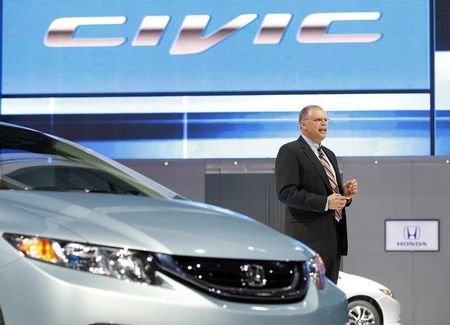By Yoko Kubota
TOKYO (Reuters) - Honda Motor Co (T:7267) is recalling about 63,200 vehicles due to a defect in driver-side air bags made by Takata Corp <7312.T>, the latest in a series of air bag recalls across the industry that have affected nearly 16 million vehicles to date.
Honda is recalling certain CR-V, Civic, Brio and Amaze, model years 2012-2015, mostly in China and other Asian countries, the automaker said on Thursday.
It is also recalling vehicles from several countries in Europe, Latin America and Africa, spokesman Teruhiko Tatebe said. The car maker is not recalling any vehicles in North America, he added.
In the affected vehicles, Takata's driver-side air bag could contain an inflator that were manufactured with an incorrect part, Tatebe said.
As a result, when an air bag is deployed, the inflator could explode with too much force and shoot out metal fragments into the vehicle, the company said in a statement.
Honda has received no reports of injuries or accidents as a result of the problem, Tatebe added.
Takata could not be reached immediately for comment.
Honda discovered the problem after General Motors Co (N:GM) recalled around 33,000 Chevrolet Cruze sedans in North America in June over the same defect, the Honda spokesman said.
GM recalled the Cruze after an accident in October 2013 left a Georgia woman blind in one eye and a lawsuit was filed in April this year.
Since November 2008, multiple automakers including Honda, Toyota Motor Corp (T:7203) and BMW (DE:BMWG) have recalled around 12.3 million vehicles globally due to Takata's driver-side and passenger-side air bag inflators that could explode.
In most of the past recalls, automakers and Takata found defects in propellants, which burn and emit gas to fill up the air bag when it is deployed. Some propellants were manufactured with too little force, some were exposed to excessive moisture before they were packed inside inflators, and in one case, not enough propellants were loaded.

On top of that, some 3.5 million vehicles are currently the targets of regional recalls in certain high-humidity areas in the United States, or what many automakers call "field action", after U.S. safety regulators started investigating reports of inflator explosions in Florida and Puerto Rico.
(Editing by Miral Fahmy and David Holmes)
